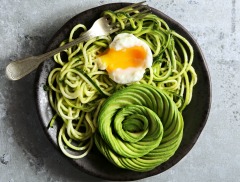Don't just meal plan... meal plan intelligently - with Meal Genius! Sign up for our free newsletter to get delicious recipes, sample meal plans and a whole lot more!
Kiwi
Kiwi fruit is native to eastern Asia where several species of Actinidia grow wild.
In the 20th century, seeds were taken from the Yangtze valley to New Zealand where commercial cultivation began in the 1930s.
Many people liken the taste of kiwi fruit, to a combination of other fruits, including strawberries, nectarines, and pineapple.
Kiwi is a an excellent source of vitamin C, with one fruit providing 117% of the RDI for this age-defying antioxidant.
Glycemic Index=53
Glycemic Load=6
Antioxidant Score (ORAC)=882
The Benefits
- Special diets: Gluten-Free Diet, Gluten-Free/Dairy-Free Diet, Grain-Free Diet, Low Acid Diet, Low FODMAP Diet, Low Starch Diet, Paleo Diet (Light), Paleo Diet (Strict), Pescetarian Diet, Primal Diet, Vegetarian Diet, Whole Food
- Excellent Source of: VitaminC, VitaminK
- Good Source of:
- Preferences: No Fish, No Red Meat, No Pork, No Eggs, No Shellfish, No Gluten, No Nuts, No Soy, No Dairy, No Poultry, No Molds, No Citrus, No Pseudograins, No Coconut, No Nightshade, No Legumes, No Grains, No Corn, No Yeast, No Peanuts, Low Carbohydrate, Low Cholesterol, Low Fat, Low Sodium, Low Saturated Fat
Related Nutrients
Selecting and Storing
Select plump kiwi that yield to gentle pressure and are fragrant. To ripen kiwis, leave them at room temperature, away from heat or direct sunlight, for a few days to a week.









